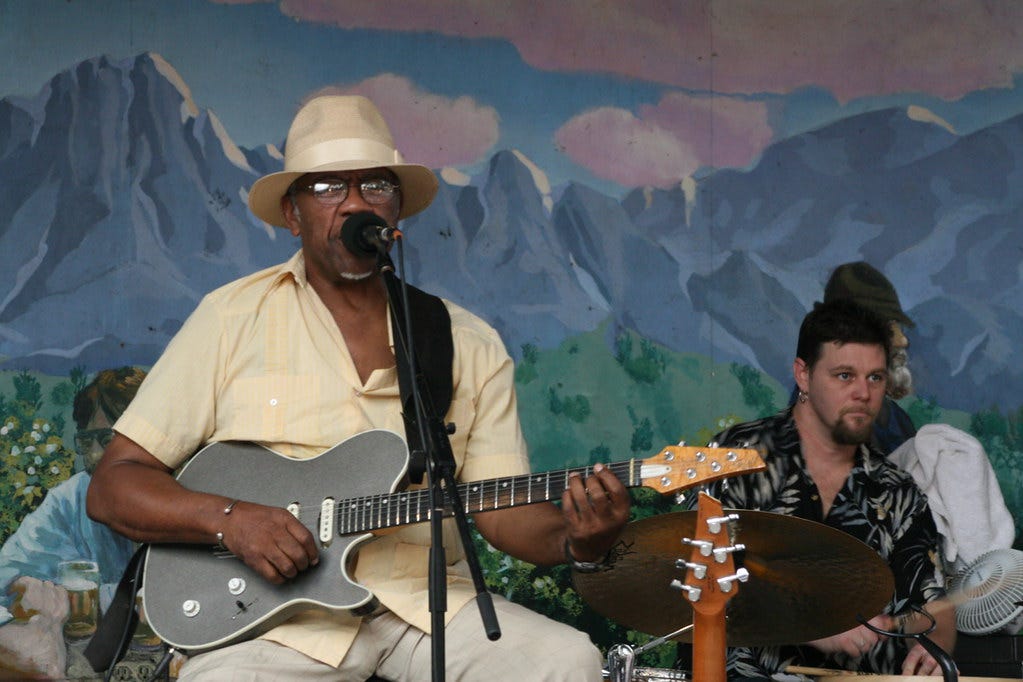Happy Birthday to Austin's "Godfather of the Blues"
An interview with W.C. Clark, 81 today, on the eve of his 2002 comeback LP "From Austin With Soul"
He's been called "the Godfather of Austin Blues" for his mentoring of Stevie Ray Vaughan and other white guitar slingers who migrated to Austin in the '70s. But with a new album that sounds like it was produced in Memphis in the late '60s, W.C. Clark comes off as the great soul singer we didn't know we had.
From Austin With Soul (Alligator) features Clark's trademark stinging guitar leads, but the key instrument is a voice thick and pleasing as barbecue smoke, as Clark conjures such soulful bluesmen as O.V. Wright, Clarence Carter and Little Milton. Produced by Kaz Kazinoff with the right mix of grit and grace, From Austin is comfort music, especially coming from a veteran player who toured the "chitlin circuit" with Joe Tex in the '60s.
"I've never made a record before that felt so right," Clark says by phone from a Travelodge outside Milwaukee. Garnering rave reviews and scattered airplay on stations as far away as Ottawa, the man in the fedora has taken to the road like a 23-year-old with a debut album to push. "Man, it's like everything is falling into place after all these years." Who would've thought that at age 62, almost 50 years after he made his guitar-playing debut with the Southern Wonders gospel quartet and more than 25 years after he quit his job as a mechanic at McMorris Ford to play full time, the man raised in the St. John's Colony where Highland Mall now stands would make the album of his career?
Five years ago, Clark wasn't sure he'd ever play music again. Consumed with guilt after a van he was driving flipped off the road 40 miles north of Dallas, killing his fiancee Brenda Jasek and longtime drummer Pete Alcoser Jr., Clark didn't think he could ever take the stage again with the same fire. Later that year, he won a W.C. Handy Award, the most prestigious in the blues genre, for the album Texas Soul. But all he could think about was what he'd lost.
But after a few months in mental limbo, he had a revelation. "I was sitting on a commode, of all places, and I decided to stop feeling sorry for myself," Clark says. "I stared at my hands, which had been hurt in the accident, and I realized that it's all in God's hands and what he put me here to do was sing and play guitar, so what was I waiting for?"
1998's Lover's Plea, which included a song written for Jasek called "Are You Here, Are You There," won another W.C. Handy, and when "Austin City Limits" included a jam between Clark and Vaughan on a "Best of" show later that year, he was exposed to a new generation of blues guitar aficionados. Getting back in the van was the hard part, Clark says, but finding appreciative crowds at every stop kept him going.
"Folks are always writing about how I taught Stevie and Jimmie, but I actually learned as much from them as they learned from me," he says of the Vaughan brothers. "The No. 1 thing those young cats taught me was endurance. As long as the people are coming out to see you, you play as long and as hard as you can every night."
Along the way, Clark came to the attention of Bruce Iglauer, who had turned an obsession with electric blues into Chicago's Alligator Records three decades ago. Iglauer signed Clark, best known nationally as the co-writer of the Vaughan hit "Cold Shot," and the two met several times to talk about music and discuss the record. "I knew we were on the same wavelength when we started talking about O.V. Wright," Clark says. "I had always wanted to make a record in that funky, soul-blues style, and Bruce just went, 'Yeah, that's it!' "
Clark says Iglauer stayed completely out of the recording process at Austin's Arlyn and Pedernales studios. "He said for us to just do it like we wanna do it, and at first I thought, 'I've heard that one before.' But it turned out that we did have total creative freedom." Clark says he found himself singing with newfound conviction. "If a producer is telling me to sing this way or that way, I can do it," he says, "but I won't feel it in my bones like I did with this record." If this isn't the real thing, then grits ain't groceries.
The blues are about making something positive from a negative situation -- a good song from a bad time -- and nobody knows about such silver linings like Clark. After the fatal '97 accident, doctors ran several tests on W.C. to make sure there weren't internal injuries. And that's when they detected that he had prostate cancer.
"They never would've found it if it wasn't for that accident," Clark says. "How's that for dumb luck?" After doctors implanted time release pellets in Clark's prostate, the cancer has almost completely disappeared.
"I done survived a lot in the last few years," says Wesley Curley Clark. "It wouldn't make sense to let up now."



